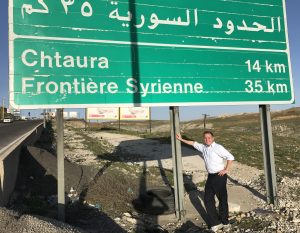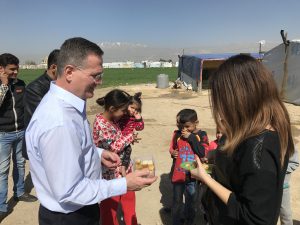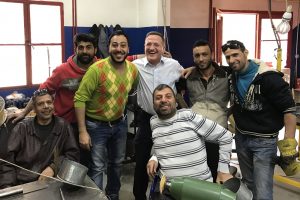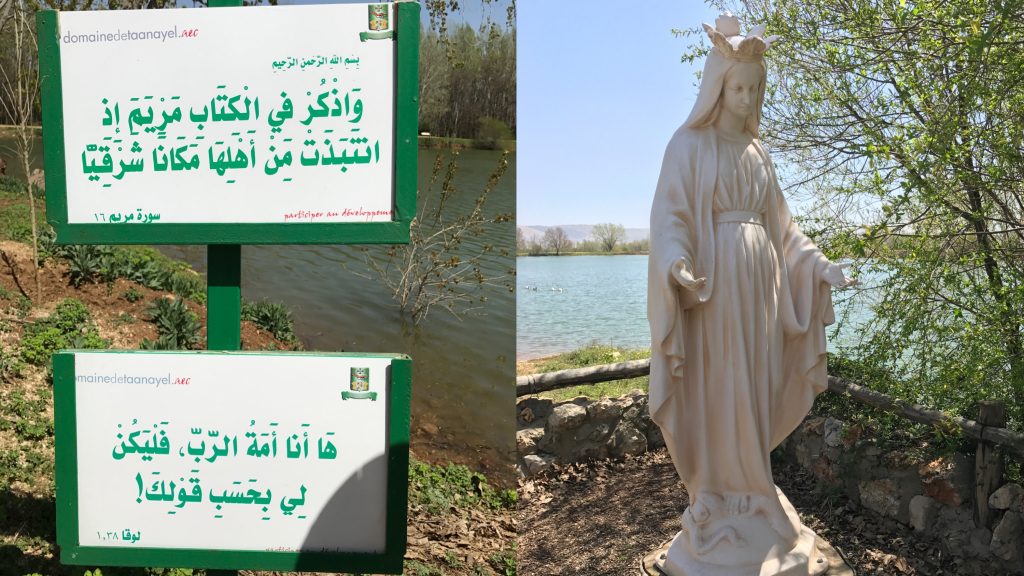Dear Friends and Colleagues,
I’ve just returned from visiting Syrian refugee camps in Lebanon. The scale and depth of the tragedy is hard to comprehend: millions facing little or no chance of employment, education or mobility.
Amidst this great need, there are reasons for hope:
→ In Beirut I had positive meetings exploring how the resources from RFBF’s Empowerment+ initiative might help the work of NGOs in Lebanon and the Arab-speaking world. Indeed, Lebanon itself offers many reasons for hope.
→The Middle East Women’s Leadership Network is partnering with RFBF to launch a global religious freedom film competition, challenging women filmmakers around the world to create short films that showcase how religious freedom leads to innovation, peace, security, entrepreneurship, and human flourishing in communities.
You can read the details below.
Brian Grim, RFBF President
Refugee Camps
Official estimates put the number of refugees from Syria at 1.5 million, but most agree that the number is certainly higher.
Some have been on the run for four or more years, finding themselves in foreign lands with limited resources to receive them.
In one makeshift camp we met with a family who have only seen a UN worker once in the two years they’ve been in the camp.
Suspicions also are present in the camps, with neighbors not knowing which side of the conflict landed each other in the same camp. Some were well off, others not. All now share a day -to-day existence that our team could drive away from, but they were left facing little or no chance of employment, education or mobility.
 In one small camp, the refugees created a makeshift school with almost no support or resources.
In one small camp, the refugees created a makeshift school with almost no support or resources.
As we gathered in the school building with windows painted on the outside and then in one of their homes, they shared with us the loss of husbands, fathers, and the life that once was. Their greatest concern was that their children would become a generation lost to the opportunities education provides.
A distant hope many have is that a spot opens for them to immigrate to a Western nation.
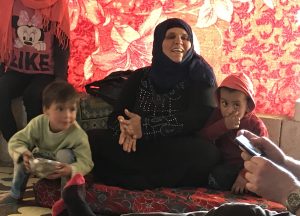 At the same time, they hear stories of how life in the West is not easy either, especially for foreigners with different religions and separated by languages.
At the same time, they hear stories of how life in the West is not easy either, especially for foreigners with different religions and separated by languages.
In our Empowerment+ program in Manchester, UK, we have been working with a Syrian refugee family. The woman pictured with two of her children recoded a video message to take to the family in the UK. As with all the parents we spoke to, the depravation of education for her children was the greatest concern.
Just being able to speak to the world beyond brought smiles despite the tremendous hardships.
Countries like Lebanon are in an especially tough bind. For a country of about 4.5 million, hosting nearly 2 million additional refugees is unfathomable. That would be like the United States receiving more than 100 million refugees.
The U.S. admitted 84,995 refugees (0.085 million) in the fiscal year ending in September 2016.
Despite the challenges, efforts in Lebanon are truly heroic.
NGOs
There are hundreds of non-governmental organizations (NGOs) working in Lebanon, addressing the needs in varying degrees. Two leading NGOs we spent time with are the Makhzoumi and Adyan Foundations, both of which I’ve known for a number of years.
We are exploring how the interfaith Empowerment+ resources might be useful to the missions of both these foundation.
Pictured with me are staff at the Makhzoumi Foundation with our delegation, including Fr. Tim Byron, SJ, from Manchester, and Sandra Chaoul who works with Jesuit Refugee Services (JRS) in the Middle East and North Africa.
Following the violent events in Syria from 2011 onwards, JRS now provides emergency relief to Syrians both inside Syria, and in neighboring countries, including Lebanon.
The Relief and Humanitarian Unit of Makhzoumi Foundation works with several United Nations Agencies, International NGOs and local partners to provide services to beneficiaries of all nationalities in Beirut and Mount Lebanon, including the Palestinian camps in Beirut. The unit’s overall objective is to ensure assistance and humanitarian protection to refugees, displaced people and vulnerable host communities.
In support of our initiative, May Makhzoumi, president of the foundation, and Samer El Safah, General Manager, met together with us and the British Ambassador to Lebanon and senior staff to explore possibilities of bringing our made-in-Manchester Empowerment+ to Lebanon.
 We also had meetings with Adyan Foundation director Fr. Fadi Daou (pictured on the left with Pope Francis).
We also had meetings with Adyan Foundation director Fr. Fadi Daou (pictured on the left with Pope Francis).
Adyan was founded on 6 August 2006 by members from Christian and Muslim denominations. Adyan works on valuing cultural and religious diversity in its conceptual and practical dimensions, and on promoting coexistence and diversity management among individuals and communities, on the social, political, educational and spiritual levels.
Adyan envisions a world where diversity between individuals and communities is enriching; and it generates mutual understanding, intercultural citizenship, creative development, sustainable peace and spiritual solidarity.
Lebanon’s Rainbow
Within a few minutes of the Syrian border is an amazing beacon of hope. This interfaith enterprise has won UN and World Economic Forum awards. Here’s the rainbow story.
In French, archenciel means rainbow. Pictured with me are part of the Lebanese rainbow – handicapped workers of different faiths and national backgrounds – making wheelchairs in NGO Arcenciel’s workshop in the Beqaa Valley.
Each had a story of how being given work was the key to turning disabilities into abilities, and bridging differences. For them, differences were non-existent as they engaged in a common enterprise that served others and paid them a salary.
Arcenciel is a Lebanese based non-profit NGO, which supports Lebanon’s most underprivileged and marginalized communities, regardless of religion, political affiliation or nationality.
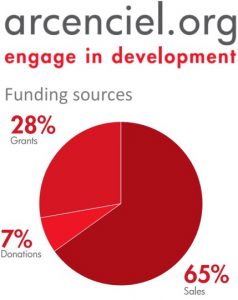 One notable aspect of Arcenciel’s program is that they have multiple business enterprises that not only empower the needy but that these enterprises help put Arcenciel itself on the road to self reliance. As shown in the chart, 65% of their funding comes from sales of their products, ranging from food produced on their farm to products from factories.
One notable aspect of Arcenciel’s program is that they have multiple business enterprises that not only empower the needy but that these enterprises help put Arcenciel itself on the road to self reliance. As shown in the chart, 65% of their funding comes from sales of their products, ranging from food produced on their farm to products from factories.
Another notable aspect of Arcenciel’s program is that they now operate a farm owned by the Jesuits in the Beqaa Valley that serves as a model for sustainable development. Not only environmentally and economically sustainable, but – from my observation – also spiritually sustainable.
On Arcenciel’s Farm
The sign in the photo below on Arcenciel’s farm contains verses from the Bible and the Quran speaking of the Virgin Mary, who is revered as the Mother of Jesus (Isa) the Messiah by Muslims and Christians alike.
Indeed, in the Middle East such bridges between people and religions are a key for sustainable development. With interfaith understanding, however, bridges can be built where conflict is less likely. Where there is peace there is development. And where there is development, there is peace.
The sign is located by a statue of the Virgin Mary.
In this Holy Week for Christians around the world, it is worth remembering that after the birth of Jesus, Joseph and Mary were forced to flee with Jesus as a refugee family into Egypt.
I imagine that the Virgin Mary has a special concern for the many families forced into exile throughout the Middle East today.

